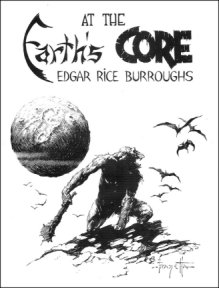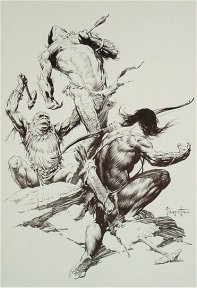
Official Edgar Rice Burroughs Tribute and Weekly Webzine Site
Since 1996 ~ Over 15,000 Web Pages in Archive
Presents
Volume 2145
TELEPATHY IN PELLUCIDAR


by Sailor Barsoom



Telepathy? In Pellucidar?! Come on, Jack; Abner Perry already told us what the Mahars do isn’t telepathy. Well, yeah, but my name isn’t Jack. And I’ll get to the Mahars later. Right now I want to deal with the Gilaks. Yes, I believe that there is telepathy going on within the Human race in the Inner World. And to get a start on Human telepathy, let’s consider the following:1) All Humans of Pellucidar speak the same language. Even communities as far removed, geographically and culturally, as Zoram and Lolo-Lolo speak exactly the same language. There doesn’t seem to be as much as a “foreign accent” to be found anywhere. And yet the Xexots are an ethnically distinct group, as are the Mezops. The Xexots are Bronze Age in technology and social organization, while the Mezops are Mesolithic mariners, and the Zoram (as well as the Sari, Kali, Amoz, Suvi, and many others) are Paleolithic land lubbers. But the language is rock solid identical from one to the other.So, we have a common language among Humans, other languages used by various non-humans, and a homing instinct that isn’t fooled by a moving homeland.2) There ARE other languages in Pellucidar, and some Humans have learned them. The Sagoths have one language they use with each other, and another which they use when conversing with the slaves of the Mahars. The language they use for themselves is similar or identical to the language of the Mangani of Africa, which Tarzan learned growing up. The “slavery language” is no longer in use, at least not within the Empire of Pellucidar. Both languages are different from what Humans use amongst themselves.
3) The homing sense of Pellucidarians is remarkable. Drop a Sarian (or Xexot or Mezop or any other) in some remote, unfamiliar part of the Inner World, and with no stars and a stationary sun the Sarian (or Xexot or Mezop or any other) will find her way home by the shortest route. She can point to her homeland with GPS-like precision. Even the inhabitants of the floating island of Ruva can always point directly to Ruva, despite the fact that Ruva is always moving about. Remember this; it’s important.
Let’s look at these three things, and see if they make any sense.
COMMON LANGUAGE
As we’ve seen, Pellucidarians from tribes or cities who have never seen each other, never even heard of each other, speak the same language. They speak it the same way, too. There’s never a hint of any regional dialect, or even a distinctive accent. A Kalian in Tanga-Tanga could easily pass himself off as a native, if he can hide in the shadows. His skin (brown instead of yellow) would betray him, but his speech would not.
Just how in blazes is such a thing possible? We might well imagine that the Kalians and Xexots share common ancestors, and indeed that the Mezops and Thurians and all the others do as well. These ancestors could have found their way to Pellucidar through the North Polar Opening or through one of the Hoos proposed by Den Valdron. It is even possible that it only happened once, or only happened once in the part of Pellucidar known to David Innes. These hypothetical ancestors might well have shared a common language, as they would likely have been of the same culture.
But that was a long time ago. Since then, they’ve had time to develop into island-hopping mariners, dinosaur-taming herdsmen, Bronze Age city-dwellers, and several other distinct cultural groups. They’ve had time to become brown-skinned, red-skinned, black-skinned, yellow-skinned, and pale-skinned. Oh yes, they’ve been apart for a great many generations.
And no linguistic drift. No dialects. No accents. No slang. No tendency to say “I’m thah daughtah of thah cheef” in one place and “I’m thee darter o’thee chiff” somewhere else. Interesting. Anything else strange about the language?
Well, how about the fact that newcomers to Pellucidar seem to learn it in a hurry? They go from {point} “David” {point} “Abner” {raise eyes and point} to "But Jubal; tell me about him, and why you ran away to be chained by the neck and scourged across the face of a world" in a remarkably short period of time. That’s quite an accomplishment. We might expect a linguistic mega-genius like Tarzan to manage that, but it seems that every visitor to the Inner World manages the same. Either they’re all linguistic titans, or the language is easy to learn.
Of course, we can’t really be sure that it was learned so fast. What seems like the hero learning Pellucidarian in a few days could actually be the hero learning Pellucidarian in a few months. How can one speak of time where time does not exist? Still, we know that von Horst learned it from Dangar before the paralyzing venom of the trodon could wear off. Come to think of it, von Horst and Dangar couldn’t even point, and von Horst still learned it quickly.
Anything else? Um… The Horribs speak it, and not only are the Horribs not Human, they’re not even mammals. However, it is likely that the Horribs learned the common language from the Phelians, Zoram, and so on. The Mahars do not speak it, but as the Mahars are all deaf, they may not even be aware that spoken languages exist. The Coripies and Gorbuses and probably a few I’ve forgotten speak Pellucidarian, but they all seem to be variants on Humans, so that just brings us back to the big question, which is: Why do all the Humans speak the same language? Is there anywhere other than Pellucidar where such a thing is known?
Actually, there is. All the people of Barsoom, from the savage Green men to the high-tech Red men to the relic Orovars and Okarians speak the same language. Only among the First Born of Omean is any other language spoken, and even they use it only for naming and as a sort of code language. Various scholars of Barsoom have attributed this to the world-girdling influence of the Orovars, to a trade-language that survived the Drying of the Seas, and other things. Mostly, though, it seems to be tied to the well-established Martian faculty for telepathy.
Interesting. We will be returning to Barsoom later, but now it’s back to the Earth’s core.
OTHER LANGUAGES
Other languages do indeed exist in Pellucidar, but only one of them do we know much about. This is the language of the Sagoths.
This is the same tongue spoken by the Mangani of Tarzan’s Africa. Indeed, Tarzan is both surprised and delighted when first he hears a Sagoth speak it to him. So, does this tell us anything?
Actually it does. The first thing it tells us is that there are two common languages in Pellucidar: one spoken by Humans, the other spoken by Sagoths. It certainly seems reasonable to assume that if the anthropoids of both Africa and Pellucidar speak the same language, then the anthropoids of one part of Pellucidar would speak the same language as those of another.
The other thing is that the Sagoth language isn’t exactly like that which Lord Greystoke grew up with. For one thing, the Sagoths don’t call themselves Mangani, or any variation of Mangani. They call themselves Sagoths. Nor do they refer to Humans as Tarmangani, Balmangan, Gomangani, or anything even remotely similar. No, they call them Gilak, just like the humans themselves do. They also seem to use the same word, thipdar, to describe the huge pterosaurs on the Inner World.
So they’ve adopted Pellucidarian words into their language. Mostly words which would be useless in Africa, where there are no pterosaurs. Indeed, they’ve even taken the Pellucidarian word for themselves, instead of some Mangani variant. As the Pellucidarian language is the same everywhere, we can be reasonably sure that the Sagoths have adopted the same useless-in-Africa words everywhere.
This isn’t so surprising when one considers that the Sagoths are sharing the world with Humans, and that there are a lot more Sagoths in Pellucidar than there are Mangani in Africa. Thus, some Pellucidarian Humans have learned to speak the language of Sagoths, even if only a little.
However, the two languages are not the same, so one cannot explain the universality of Pellucidarian language by appealing to the universality of Mangani/Sagoth. No, there’s something more going on.
HOMING INSTINCT
Very useful thing, that homing instinct. With no celestial bodies other than a stationary sun always exactly in the middle of the sky, and where even such landmarks as a mountain peak tend to blend into the upcurving landscape instead of standing out against the horizon, you’d better have a homing instinct.
And indeed the Humans of Pellucidar do. With it, they can do better than say, “I left home in the direction of the setting sun, so to get back home, I need to travel in the direction of the rising sun.” That’s pretty general, and wouldn’t work in the Inner World anyway. No, a Pellucidarian can point exactly to his homeland. “Sari is that way.” It’s never wrong, and can always be trusted.
Or can it? In Savage Pellucidar, the beautiful liar O-aa finds herself stranded at sea. This is not by choice, but because she has been abducted by a man from the island of Canda. After killing the Candan and dumping him overboard, she realizes that she is lost. As far as she can see, there is only the blue of the ocean, gradually lost into the blue of the sky. O-aa is a cave girl from land-locked Kali, and finds this experience rather unnerving. For one thing, she doesn’t know how to get back to Kali, or even in which direction her home lies.
Of course she was endowed with that homing instinct that is the common heritage of all Pellucidarians to compensate them for lack of heavenly bodies to guide them, but out here on this vast expanse of water in an environment so totally unfamiliar, for the first time in her life she did not trust it.How do you not trust something which is as much a part of you as vision or hearing, and which has never been wrong? But this isn’t the first time we hear of the homing instinct being rendered useless by the sea. In the second book, Pellucidar, David Innes tells us:Quite suddenly a thought occurred to me. I was surprised that it had not come before as a solution to our problem. I turned toward Juag.And again, in Tanar of Pellucidar:"You Pellucidarians are endowed with a wonderful instinct," I reminded him, "an instinct that points the way straight to your homes, no matter in what strange land you may find yourself. Now all we have to do is let Dian guide us toward Amoz, and we shall come in a short time to the same coast whence we just were blown."
As I spoke I looked at them with a smile of renewed hope; but there was no answering smile in their eyes. It was Dian who enlightened me.
"We could do all this upon land," she said. "But upon the water that power is denied us. I do not know why; but I have always heard that this is true—that only upon the water may a Pellucidarian be lost. This is, I think, why we all fear the great ocean so—even those who go upon its surface in canoes. Juag has told us that they never go beyond the sight of land."
Tanar moved always in one direction and his homing instinct assured him that the direction lay toward Sari. As far as the land went he could move unerringly toward the spot in Pellucidar where he was born. Every Pellucidarian can do that, but put them on the water, out of sight of land, and that instinct leaves them and they have no more conception of direction than would you or I if we were transported suddenly to a land where there are no points of compass since the sun hangs perpetually at zenith and there is no moon and no stars. Tanar’s only wish at present was to put them as far as possible from the village of Lar.So there we have it. The homing instinct is infallible, except at sea.Except for Mezops. They seem to retain it when at sea, and it is even standard practice to have a Mezop stand near the front of a ship and point to the Anoroc Islands until he tires, at which time he will be replaced by another pointing Mezop.
Come to think of it, that man of Canda who was abducting O-aa was well out of the sight of land, and didn’t seem bothered by it. Was his homing instinct working? Why his and not O-aa’s?
Perhaps it’s as simple as some people lose it on the ocean and some don’t. Over generations, sea-farers who lose themselves on the water die, leaving fewer descendants, while those who retain the instinct survive to pass on their even-at-sea homing instinct genes. Land-lubbers have no such evolutionary pressure, so they never accumulate individuals with the even-at-sea genes.
Or maybe it’s still there at sea, but different. Perhaps O-aa would find that, instead of pointing right at Kali, she would have to wave her hand through several degrees and say “somewhere in that general direction.” To somebody who had been used to utter precision her entire life, this would be frightening. She might well find herself unable to trust an instinct which was giving her fuzzy results, especially if she tended to be afraid of the ocean anyway.
Perhaps the Mezops and Candans have simply learned, through a lifetime of training, to refine their instinct back to the precise thing it is on land, or to live with the ambiguity. Perhaps there is both this and the genetic accumulation of genes thing going on.
But none of this really answers the big question, which is “how would such a homing instinct work?”
OK, let’s talk about those Mahars. I’ll get back to the homing instinct, really I will.
MAHARS: TELEPATHIC OR NOT?
Abner Perry insists in At the Earth’s Core that what the Mahars do is not telepathy. David wonders if it is, but Abner is certain.
Among themselves they communicate by means of what Perry says must be a sixth sense which is cognizant of a fourth dimension.Don’t feel bad, Mr. Innes; I don’t quite get it either. In fact, I have to wonder if perhaps Perry is just off on some flight of fancy. He seems to have leapt in a single bound from “well, it looks like telepathy, but only works when they are near each other” to “wow! It must be a sixth sense fourth dimension thing!” The old man is a dear, and really quite smart, but he’s also the guy who, when asked to build a canoe, started designing a battleship.I never did quite grasp him, though he endeavored to explain it to me upon numerous occasions. I suggested telepathy, but he said no, that it was not telepathy since they could only communicate when in each others’ presence, nor could they talk with the Sagoths or the other inhabitants of Pellucidar by the same method they used to converse with one another.
“What they do,” said Perry, “is to project their thoughts into the fourth dimension, when they become appreciable to the sixth sense of their listener. Do I make myself quite clear?”
“You do not, Perry,” I replied.
Besides, if they are really projecting their thoughts to each other, through the fourth dimension or not, well isn’t that telepathy? But Perry tells us that, no, it is not, because it only works at very close range, and because they can’t use it with Sagoths or Humans.
Now, as far as the first objection goes, we all know of a place where the inhabitants do indeed have telepathy, and it only works at short range. That place is Barsoom. As John Carter tells us in A Princess of Mars:
As he closed the door of my chamber behind him his thoughts were cut off from me as was the sight of him, which seemed strange to me in my little knowledge of thought transference.Well, here we are again on the Red Planet. But think about it: Barsoomians are telepathic, every last egg-hatching one of them. This is so established that if anybody tried to say “well it isn’t really telepathy because they can’t do it through walls or around corners or between cities,” we’d all laugh. Sure, it’s limited telepathy, but it’s still telepathy.As for Perry’s second objection, that the Mahars can’t use whatever it is they do with Humans, well Perry hadn’t seen the Mahar rituals on the Anoroc Islands. Neither had Innes, yet. But see it he would, in all its chilling detail.
The queen fixed her gaze upon a plump young maiden. Her victim tried to turn away, hiding her face in her hands and kneeling behind a woman; but the reptile, with unblinking eyes, stared on with such fixity that I could have sworn her vision penetrated the woman, and the girl's arms to reach at last the very center of her brain.So much for the idea that Mahars can’t use their mental abilities on Humans. Indeed, this whole event resembles nothing so much as when Luud, the king of the Kaldanes, put the telepathic freeze on Gahan of Gothol. Yep, Barsoom again. And nobody questions that what the Kaldanes do is telepathic in nature.Slowly the reptile's head commenced to move to and fro, but the eyes never ceased to bore toward the frightened girl, and then the victim responded. She turned wide, fear-haunted eyes toward the Mahar queen, slowly she rose to her feet, and then as though dragged by some unseen power she moved as one in a trance straight toward the reptile, her glassy eyes fixed upon those of her captor. To the water's edge she came, nor did she even pause, but stepped into the shallows beside the little island. On she moved toward the Mahar, who now slowly retreated as though leading her victim on. The water rose to the girl's knees, and still she advanced, chained by that clammy eye. Now the water was at her waist; now her armpits. Her fellows upon the island looked on in horror, helpless to avert her doom in which they saw a forecast of their own.
We can forgive Abner Perry for getting this wrong. He had limited knowledge of Mahars to go on, and even less knowledge of telepathy. But the truth is, he did get it wrong. The Mahars of Pellucidar are telepathic.
HOMING IN ON THAT INSTINCT
So how would a homing instinct work? Several possibilities suggest themselves. All have their problems.
It could be magnetic in nature. The brains of Pellucidarians are sensitive to the magnetic field of the Earth. They are walking compasses. Several birds use this method, and it’s even been suggested for housecats. The problem with this is that Pellucidarians don’t just know which way is north or which way is south, they know which way is home. But a magnetically-based homing instinct might still just be doable.
Perhaps, while growing up, they subconsciously measure the angle between where they are and both the magnetic north pole and the magnetic south pole. This magnetic triangle is “home.” When away from home, they note, again subconsciously, the difference in angles between where they are and the “home angle.” They can then point to the direction in which they would have to travel in order for the angle to more closely resemble the “home angle.”
Man, that’s a lot of subconscious geometry! While we cannot, perhaps, dismiss it simply on the grounds of its subconscious mathematical complexity, I’ll be glad if we can find something better.
Perhaps the soil in and around Kali has a special mineral, a mineral which gets into the plants the Kalians eat. This mineral is somehow attracted to its source (maybe because there’s so much of it there). The Kalian takes this mineral in during childhood, and when, as an adult, he goes somewhere else, the mineral inside him is attracted to its source. His brain is sensitive to this, much in the way that we speculated that it might be sensitive to the Earth’s magnetic field. Only this time there’s no fancy geometry; the attraction is straight back to the source of the mineral.
This has a good, pulpy, pseudoscientific feel to it. But there are problems. First, each village would need to have a “home mineral,” and it would have to be different for each village, and would have to occur no place else in all of Pellucidar. Otherwise, why would the Kalian not be pointing to Suvi? Or Lolo-Lolo? New villages would have to be placed where there was a suitable home mineral, unlike any other home mineral. This means that we need, not one special mineral, but hundreds, if not thousands.
None of these explanations explains how the people of Ruva can always point to a homeland which moves around. The mineral thing seems dead in any case, and the geomagnetic method would be utterly useless.
Well, you can guess where I’m going with all of this.
What if the brain of the Pellucidarian is attracted, not to some mineral he grew up with, but to the minds he grew up with? To his mother’s mind, his father’s mind, his brothers’ and sisters’ and cousins’ minds? Even the minds of people he doesn’t really know, but which are around him often. A whole village of minds, if there is any telepathic capability at all (and the universal language suggests that there is) might, if all working together, be quite a significant thing. They might well accomplish what a single mind could never do alone. One mind isn’t enough for the instinct to work, thus disallowing comrades and couples to home in on each other, but a whole village would be sufficient.
What I am suggesting is that, as a Pellucidarian grows up, he becomes gradually attuned to these minds, and can tell in what direction they are. He can’t send and receive messages or anything like that; the collective telepathic output of the village acts only as a beacon. A beacon is a simpler thing than a walkie-talkie, and would be easier to evolve. Not that easy, or everybody on the outer Earth would have it too, and the confirmedly telepathic Barsoomians damn sure would. But on Earth or Barsoom, there are sunrises and moons and a defined horizon. A homing instinct might be useful, but isn’t really necessary. Only in timeless, directionless Pellucidar was the evolutionary pressure strong enough to produce the homing instinct.
Of course, it’s easy to take something which seems to defy explanation and just say, “Eh, it’s telepathy.” If telepathy is proposed as an explanation for the homing instinct, it needs to be able to explain that instinct better than other possible explanations, and it needs to have fewer problems. So, does it?
While the “home mineral” explanation would seem to be just plain goofy, the magnetic explanation might be a contender. What are the pros and cons of the magnetic hypothesis, as opposed to the telepathy hypothesis?
On the pro side, there is the fact that magnetic navigation is known to exist, both in nature and in man-made compasses. Some species of birds use it, housecats might use it, and perhaps even sea turtles use it. There are no confirmed cases of any species using telepathic navigation, in our world or Burroughs’. At least, it’s never stated as such.
On the con side, there is no evidence, other than the homing instinct itself, that Pellucidarians have any sort of magnetic sense at all. Indeed, there is never any mention of magnetic navigation at all except for with man-made compasses. Nor are the Humans of Kaspak, Barsoom, Amtor, or any other part of the Burroughs Universe said to have any capability for sensing magnetism. Telepathy, however, is an established fact in the Burroughs Universe, and I believe that we have established that it exists in Pellucidar: among the Mahars certainly, among Gilaks probably.
But the clincher is the Floating Island of Ruva. A magnetic sense just wouldn’t help with a homeland that moves about. But a telepathic sense would, since the people whose minds are guiding one back home are also all moving.
What I still have no explanation for is why the instinct would vanish at sea for most Pellucidarians, and why it would not for others. Perhaps it’s as simple as a link between being afraid and being able to receive that beacon.






|
The
Fantastic Worlds of Edgar Rice Burroughs
ERB
Companion Sites Created by Bill Hillman
BILL
HILLMAN
Visit
our thousands of other sites at:
BILL
& SUE-ON HILLMAN ECLECTIC STUDIO
ERB
Text, ERB Images and Tarzan® are ©Edgar Rice Burroughs, Inc.-
All Rights Reserved.
All
Original Work ©1996-2008/2018 by Bill Hillman and/or Contributing
Authors/Owners
No part
of this web site may be reproduced without permission from the respective
owners.